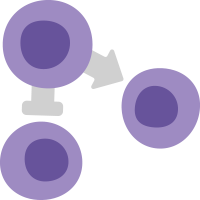
Immune Regulation News
Immune Regulation News is an online resource covering research into the regulation, suppression, and modulation of the immune system.
Inhibition of ENT1 Relieves Intracellular Adenosine-Mediated T Cell Suppression in Cancer
Researchers showed that adenosine suppresses anti-cancer T cell responses following uptake into activated T cells by equilibrative nucleoside transporter 1 (ENT1) and inhibition of de novo...
A Probiotic Approach Identifies a Treg-Centred Immunoregulation via Modulation of Gut Microbiota Metabolites in People with Multiple Sclerosis and Healthy Individuals
[eBioMedicine] Investigators found a lactobacilli-enriched probiotic that promotes a regulatory immunophenotype in people with multipel sclerosis (MS), probably by enhancing AHR agonists in the gut. It may be of interest as add-on therapy in immune-mediated diseases such as MS.
IDO Can Improve Ovarian Function in Premature Ovarian Insufficiency via AhR and Regulatory T Cells
[Biology of Reproduction] Human ovarian granulosa cells were collected via the density gradient method, pZP3 was used to establish an immune POI mouse model, and an AAV vector carrying indoleamine 2,3-dioxygenase (IDO1) was injected into mouse ovaries to induce IDO overexpression.
Regulatory T Cells Suppress TLR9-Induced Formation of Intrahepatic Myeloid-Cell Aggregates for T Cell Population Expansion in Liver
[Medical Microbiology and Immunology] Scientists investigated whether Tregs are involved in regulating toll-like recepto r9-induced intrahepatic myeloid-cell aggregates for T cell population expansion formation and the mechanisms behind it by using different gene knockout mice and blocking antibodies.
The Paeonol of Total Glucosides of White Peony Regulates the Differentiation of CD4+Treg Cells through the EP300/Foxp3 Axis to Relieve Pulmonary Fibrosis in Mice
[Cell Biochemistry and Function] Researchers investigated whether paeonol could improve pulmonary fibrosis in mice by regulating through the EP300/Foxp3 axis. The ratio of CD4+T/Treg cells was measured in vitro, and immunofluorescence was used to detect the intensity of α-SMA.
Regulatory T Cells in Tumor Microenvironment: Therapeutic Approaches and Clinical Implications
[Cell Biology International] Extensive research has consistently shown that Treg cells play a pivotal role in facilitating tumor initiation and progression. Conversely, the depletion of Treg cells has been linked to a marked delay in tumor growth and development.
Positive EMA Opinion on Pediatric Investigation Plan for PolTREG’S Treg Therapy in Type 1 Diabetes
[PolTREG S.A.] PolTREG S.A. announced that the Pediatric Committee of the European Medicines Agency has issued a positive opinion on the Pediatric Investigation Plan for its investigational somatic cell therapy product, polyclonal Treg lymphocytes, aimed at preventing symptomatic type 1 diabetes in children.
DNGR-1 Regulates Proliferation and Migration of Bone Marrow Dendritic Cell Progenitors
[Journal of Experimental Medicine] Scientists showed that DNGR-1, an innate immune receptor expressed by onventional dendritic cells (cDC) progenitors and type 1 cDCs, can regulate cDCpoiesis in mice.
Proenkephalin Produced by Neonatal T-Bet+ Treg Cells Promotes Periportal Hepatocyte Maturation
[Hepatology] Researchers demonstrated that 2-week-old mice deficient in lymphocytes, CD4+ T cells or T-bet+ Tregs exhibit comparable increases in ductal plate cell/cholangiocyte differentiation and impaired periportal hepatocyte maturation.
BCOR and ZC3H12A Suppress a Core Stemness Program in Exhausted CD8+ T Cells
[Journal of Experimental Medicine] Investigators demonstrated that ZC3H12A deficiency initiates a stemness program in TCF1+ precursor-exhausted T cells (TPEX) but also increases cell death, whereas BCOR deficiency predominantly promotes TPEX proliferation.
The Integrated Stress Response Pathway Coordinates Translational Control of Multiple Immune Checkpoints in Lung Cancer
[Cancer Research] Researchers sought to uncover additional immune checkpoint proteins regulated by the integrated stress response to elucidate mechanisms of tumor immune escape.
PILRα on Tumor Cells Interacts with the T Cell Surface Protein CD99 to Suppress Antitumor Immunity
Investigators identified the tumor cell-expressed paired immunoglobulin-like type 2 receptor alpha (PILRα) as an immune suppressor targeting T cells using high-throughput screening.
[Nature Cancer] Abstract
For over a decade, Immune Regulation News has been keeping the scientific community up-to-date with the latest research and reviews related to immune regulation. Key research areas covered include the roles of regulatory T cells (Treg cells) in autoimmunity and self-reactivity, as well as immune response to disease, transplantation and cancer. We also provide vital updates on the latest jobs and upcoming events in the field of immunology.

 Cancer Stem Cell News
Cancer Stem Cell News Cell Therapy News
Cell Therapy News Dermal Cell News
Dermal Cell News Endothelial Cell News
Endothelial Cell News ESC & iPSC News
ESC & iPSC News Extracellular Matrix News
Extracellular Matrix News Hematopoiesis News
Hematopoiesis News Hepatic Cell News
Hepatic Cell News Human Immunology News
Human Immunology News Immune Regulation News
Immune Regulation News
 Intestinal Cell News
Intestinal Cell News Mammary Cell News
Mammary Cell News Mesenchymal Cell News
Mesenchymal Cell News Muscle Cell News
Muscle Cell News Neural Cell News
Neural Cell News Organoid News
Organoid News Pancreatic Cell News
Pancreatic Cell News Prostate Cell News
Prostate Cell News Pulmonary Cell News
Pulmonary Cell News
